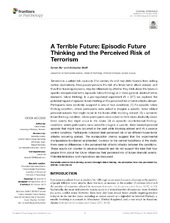| dc.contributor.author | Bø, Simen | |
| dc.contributor.author | Wolff, Katharina | |
| dc.date.accessioned | 2020-04-28T05:26:52Z | |
| dc.date.available | 2020-04-28T05:26:52Z | |
| dc.date.issued | 2019-10-22 | |
| dc.Published | Bø, Wolff K. A terrible future: Episodic future thinking and the perceived risk of terrorism. Frontiers in Psychology. 2019;10 | eng |
| dc.identifier.issn | 1664-1078 | |
| dc.identifier.uri | https://hdl.handle.net/1956/22022 | |
| dc.description.abstract | Terrorism is a salient risk source in 21st century life and may deter tourists from visiting certain destinations. How people perceive the risk of a future terror attack abroad, and thus their traveling decisions, may be influenced by whether they think about the future in specific and personal terms (episodic future thinking) or in more general, abstract terms (semantic future thinking). In a pre-registered experiment (N = 277) we explored the potential impact of episodic future thinking on the perceived risk of terror attacks abroad. Participants were randomly assigned to one of four conditions: (1) An episodic future thinking-condition, where participants were asked to imagine a specific, terror-related personal episode that might occur in the future while traveling abroad; (2) a semantic future thinking-condition, where participants were asked to think more abstractly about terror events that might occur in the future; (3) an episodic counterfactual thinkingcondition, where participants were asked to imagine a specific, terror-related personal episode that might have occurred in the past while traveling abroad and (4) a passive control condition. Participants indicated their perceived risk of six different future terror attacks occurring abroad. The manipulation checks suggest that the experimental manipulations functioned as intended. Contrary to the central hypothesis of the study, there were no differences in the perceived risk of terror attacks between the conditions. These results run counter to previous research and do not support the idea that how people think about the future influences their perceived risk of future dramatic events. Potential limitations and implications are discussed. | en_US |
| dc.language.iso | eng | eng |
| dc.publisher | Frontiers | eng |
| dc.rights | Attribution CC BY | eng |
| dc.rights.uri | http://creativecommons.org/licenses/by/4.0/ | eng |
| dc.subject | episodic future thinking | eng |
| dc.subject | episodic foresight | eng |
| dc.subject | future thinking | eng |
| dc.subject | risk perception | eng |
| dc.subject | terror risk | eng |
| dc.subject | perceived risk | eng |
| dc.subject | tourism | eng |
| dc.subject | open science | eng |
| dc.title | A terrible future: Episodic future thinking and the perceived risk of terrorism | eng |
| dc.type | Peer reviewed | |
| dc.type | Journal article | |
| dc.date.updated | 2019-11-01T09:20:11Z | |
| dc.description.version | publishedVersion | |
| dc.rights.holder | Copyright 2019 Bø and Wolff | eng |
| dc.identifier.doi | https://doi.org/10.3389/fpsyg.2019.02333 | |
| dc.identifier.cristin | 1743138 | |
| dc.source.journal | Frontiers in Psychology | |

